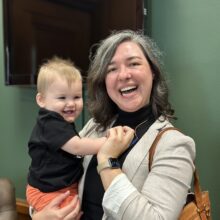The National Institute for Early Education Research (NIEER) has released three new Policy Data Snapshots on how operating statutes, program evaluation, and funding streams relate to integrating family child care programs (FCCs, or “home-based” care) into publicly funded pre-K programs, a NIEER press release says.
The snapshots also outline how these mechanisms can be optimized for FCC participation.
The policy snapshots come from a collaboration between NIEER and Home Grown that began in 2024. Through the Enriching Public Pre-K Through Inclusion of Family Child Care (EPIC FCC) initiative, NIEER experts worked with statewide pre-K leaders in Alabama, Nevada, and Michigan, plus Durham PreK in North Carolina, along with local FCC educators. The goal was to examine existing systems and develop policies and funding mechanisms to support FCCs in publicly funded pre-K programs.
The press release notes that the percentage of children enrolled in state-funded preschool programs nationwide reached an all-time high in the 2023-2024 school year, with 37% of 4-year-olds and 8% of 3-year-olds enrolled, but many children still lack access to high-quality, publicly funded preschool.
“Children enrolled in high-quality preschool programs enter kindergarten better-prepared than their peers and these benefits continue into their later educational years in academic and social-emotional outcomes,” GG Weisenfeld, NIEER’s associate director of technical assistance, said in the release. “Supporting family child care providers to deliver high-quality pre-K in state- and locally-funded programs would help more children obtain the benefits of preschool programming while supporting a workforce that has too often been excluded from public early childhood initiatives.”
Sign up for Early Bird, our newsletter on all things early childhood.
Research recently conducted by Chunyi Xu, a student at Duke University’s Sanford School of Public Policy, on behalf of EdNC outlined the significance of FCC educators in the early childhood education landscape:
Home-based providers play crucial roles in the early childhood education system. A study shows that about 6.4 million children from 0-5 receive home-based child care, representing 27.5% of all children in that age group in the United States. Their services offer flexible and convenient options, often being the only and the best choice available for families living in rural areas with limited public transportation options and needing care during nontraditional hours. Home-based care addresses equity issues for children, families, and society by being more affordable and more frequently used by under-resourced families. Families may choose home-based care when providers share a similar ethnic background with them, allowing for more responsive and culturally informed care.
According to the NIEER press release, the first brief focuses on statutes and highlights Colorado’s Department of Early Childhood and Universal Preschool Program legislation, which specifically mentions “family child care homes” as eligible providers in the state’s mixed-delivery public pre-K program.
The second brief is about the program evaluation process, and zooms in on Multnomah County, Oregon’s voter-approved preschool initiative, which the press release says “is inclusive of FCC educators, incorporates perspectives from FCC educators, and helps facilitate coaching and professional development that is meaningful and relevant to FCC educators in their unique setting.” EdNC visited the program to learn about the model in 2023. You can read more about our takeaways here.
The third brief examines funding sources that support FCCs at the local, state, and federal level, in addition to funding options from the private sector. The press release provides the example of Maryland, where FCC providers can apply directly to the state to be a pre-K contractor or apply to be a pre-K provider through the Family Child Care Alliance of Maryland.
The press release notes that additional data snapshots in the FCC & Pre-K Policy Guides series will be released in the coming months. EdNC is also following developments in Durham PreK’s participation in the EPIC FCC initiative, with reporting expected in fall 2025.





